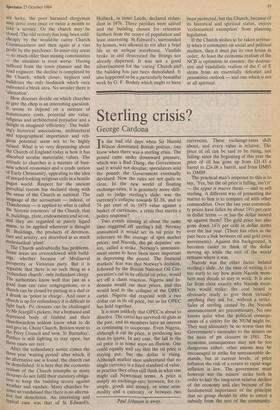Sterling crisis?
George Cardona
In the bad old days when Sir Harold Wilson dominated British politics, one knew when there was a sterling crisis. The pound came under downward pressure, which was a Bad Thing; the Government said it would not devalue; speculators sold the pound; the Government eventually devalued. Now the rules are not quite so clear. In the new world of floating exchange-rates, it is genuinely more diffi- cult to judge sterling's slide: was the currency's collapse towards $1.18, and to 74 per cent of its 1975 value against a basket of currencies, a crisis that merits a policy response?
Two events coming at about the same time triggered off sterling's fall. Norway announced it would set its oil price by reference to the average of spot market prices; and Nacods, the pit deputies' un- ion, called a strike. Norway's announce- ment seems to have been more important in depressing the pound. The financial markets' fear was that Norway's decision, followed by the British National Oil Cor- poration's cut in its official oil price, would set off a chain reaction. Nigeria and In- donesia would cut their prices, and this would lead to the collapse of the OPEC cartel. Nigeria did respond with a two dollar cut in its oil price, but so far OPEC has held together.
It is most unlikely that OPEC is about to dissolve. The cartel has survived oil gluts in the past, and its members have an interest in continuing to cooperate. Even Nigeria, although it cut its price, is producing less than its quota. In any case, the fall in the oil price is in some ways an illusion. One could equally well say that the oil price is staying put, but the dollar is rising. Although market men understand that no single currency is a fixed standard of value, in practice they often still think in what one might call Newtonian terms. A price is simply an exchange-rate between, for ex- ample, goods and money, or some com- modity and a currency, or between two Paul Johnson is away. currencies. These exchange-rates shift about, and every value is relative. The price of oil can be said to be rising, not falling: since the beginning of this year the price of oil has gone up from £21.43 a barrel to £24.08 a barrel, and from DM85 to DM89 .
The practical man's response to this is to say, 'Yes, but the oil price is falling, isn't it' — the eppur si muove thesis — and to sell sterling. A different way of presenting the matter to him is to compare oil with other commodities. Over the last year commodi- ty prices have fallen by about 141/2 per cent in dollar terms — or has the dollar moved up against them? The gold price has also gone down 141/2 per cent in dollar terms over the last year. (There has often in the past been a link between oil and gold price movements). Against this background, it becomes easier to think of the dollar moving up while the rest of the world remains where it was.
Nacods was the other factor behind sterling's slide. At the time of writing it is too early to say how many Nacods mem- bers may decide to stay at work. It is also far from clear exactly why Nacods mem- bers would strike: the coal board is obyiously ready to give them virtually anything they ask for, without a strike. Sales of sterling caused by the Nacods announcement are precautionary. No one knows quite what the political consequ- ences of a victory for the NUM might be. They may ultimately be no worse than the Government's surrender to the miners on the issue of pit closures in 1981. The economic consequences may not be too dangerous either: other unions may be encouraged to strike for unreasonable de- mands, but at current levels, of price inflation the risk of a return to rapid wage inflation is low. The government must however win the miners' strike both in order to halt the long-term relative decline of the economy and also because of the fundamental importance of the principle that no group should be able to extort a subsidy from the rest of the community. But if the Government loses, life will probably eventually go on much as before as far as it affects the financial markets.
If the causes of sterling's fall are not as serious as they at first seemed, this rein- forces the Government's position that in- terest rates need not rise in order to defend the pound. Although money market rates did creep up slightly when sterling fell, they did not go up enough to cause a rise in bank base rates. The markets may finally have understood that the Government means what it says, and that it really does intend that interest rates should be deter- mined by domestic monetary conditions rather than by movements in sterling. They did not completely believe this when rates moved up in July, but they are coming to accept it now.
The Government is right to let the market dictate sterling's value. The pound's slide is not large enough to cause a
dangerous increase in inflation. Commodi- ty prices are falling and thus offsetting the
devaluation to some extent. The impact on retail prices of the pound's fall over the last six months is likely to be at most one and a half per cent.
Sterling's fall is both a problem and a solution. In the short term it creates minor inflationary pressure and means slightly reduced living standards; in the longer term it will help us in the shift from oil production towards whatever industries the market will choose for future success. Price movements are essential to a market: it would be a great mistake to treat every such movement as a crisis.
So last week was not a 'sterling crisis'. But sterling's approach towards parity with the dollar helps to emphasise that, in a far deeper sense, there is a sterling crisis of massive proportions. The pound's value has fallen from over four dollars in 1948 to almost one dollar now. Those figures tell the economic history of postwar Britain.
Inflation, falling international competitive- ness, strikes, inefficiency, excessive taxa-
tion: all have contributed to this dismal
outcome. It is particularly depressing that we have come to this low point under a Government which is probably more ser- ious than any other postwar Government about reversing our relative decline, and when we have a first-rate Chancellor who knows exactly what needs to be done. It used to be the case that only a dramatic fall in the pound could make Labour Governments trim public expendi- ture plans. If last week's events have a similar effect on the ministerial committee currently considering public expenditure, they will have done some good. But we may be too far into the life of the present administration for there to be much chance now of a significant reversal of our long- term relative decline. The long-term sterl- ing crisis may, I fear, continue.
George Cardona was a Special Adviser at the Treasury and is currently Chief Eco- nomist at stockbrokers Montagu, Loebl, Stanley.



















































 Previous page
Previous page